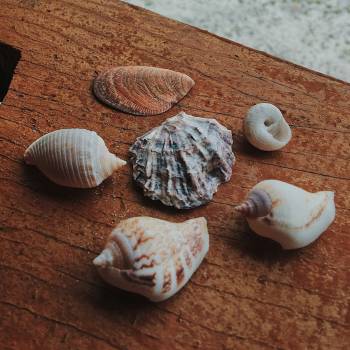It’s one of those days where things are determined to go wrong.
Every step feels heavy, your heart is filled with disappointment, and anxiety creeps up on you like your own personal storm cloud pelting you with the cold rain of dread.
Your hands are busy, but your mind is caught in a dark reverie when-
“As-salaamu Alaikum! It’s been so long. How are you?”
You blink, once, twice, holding back the tears as you look at the familiar face with its unknowing smile.
But you do more than that.
You take a deep breath, force a smile, and say, “Walaikum Salam, Alhamdulillah, I’m doing good.”
And don’t get me wrong, this is the correct response.
But the problem is, that your heart doesn’t feel any lighter after it, and the encroaching worries and fears are still pelting you in full force. The thunder of doubts still deafens your ears.
My dear brothers and sisters, saying “Alhamdulillah” doesn’t mean brushing off your pain.
It does not mean bottling your emotions and strangling your sadness.
If we are people of ‘hamd’ – who constantly praise and thank Allah in every situation- we will genuinely feel lighter once that acknowledgement rolls off our tongue.
Now, the question is: How does that work?
Let us look at an example.
The ‘Day of the Band’
The narration summary I’m about to share with you, from our brilliant and beloved Mother Aisha رضي الله عنه never fails to amaze me.
A homeless black woman was living in Masjid An-Nabawi, who would sit with her.
Aisha رضي الله عنه would often hear her say these mysterious words, “The Day of the Band was one of the wonders of our Lord, He rescued me from the disbelievers’ town.”
Finally, one day, she related her story to Aisha رضي الله عنه.
She used to work as a slave girl for an Arab tribe, who eventually set her free.
She remained with them in peace, until one day, everything changed.
One of the young women of that tribe had lost a band of red leather and precious stones. When it could not be found, the members of the tribe accused the former slave of stealing it.
She was blamed without proof and searched without permission, and the crude men went so far as to violate her.
The truth was soon revealed when a bird, which had mistaken the red band for meat, dropped it before them and left no doubt about her innocence.
After this traumatic incident, she left the people she had spent her life serving and went to Medina, accepting Islam after meeting the Messenger of Allah ﷺ.
[Bukhari, Chapter 8, No. 430]
And now here she was, relating what happened to his beloved wife and incredible scholar of this Ummah رضي الله عنه. SubhanAllah.
My brothers and sisters, this remarkable woman رضي الله عن had the strength to transform such a terrible life experience into a day of wonder and victory, a miracle that led her to leave her toxic environment and embrace the best gift of her life – Islam.
It’s important to notice that she did not sugarcoat what they did to her; in fact, she explicitly described the abuse she went through and did not make excuses for her abusers.
Her experienced mattered, and her pain was not belittled.
But she chose how she viewed the experience – she chose to claim it and own it as having empowered her and brought her to a better place.
And this is where her gratitude flowed from.
Therefore, when we say “Alhamdulillah” in all circumstances, we are not sweeping away our feelings and hurt under the carpet.
Instead, we genuinely try to shift our focus to what we have gained instead of what we have lost through our trials. This could be tapping into new reserves of strength and resilience, finding out the genuine people in your life, or tasting the sweetness of weeping in sujood for the first time.
Allah promises us that, with every hardship, there is ease.
[ Ash-Sharh: 5-6]
And seeking out the ease and mercies, knowing there is a meaning and purpose behind every single experience, will help you own your story and let no part of it own you.
The Placebo Effect
How we perceive our trauma can make or break us.
We often let our minds nurture and grow negative thoughts based on the experiences we have suffered through.
These could sound like:
“I can’t commit emotionally.”
“No one is going to love me.”
“I can’t be a good parent.”
“I’m so tired of doing the right thing when everything always goes wrong.”
“I don’t have it in me to do this.”
But, my brothers and sisters, we need to cycle interrupt.
Our thoughts can have harmful consequences.
They can stand in the way of living our best life, one in which we feel joy and gratitude in seeking Allah’s Pleasure and Promises.
If a certain thought is entertained too much, it turns into a set of behaviours, and before you know it, these habitual behaviours become who you are – your personality.
In psychological research, the power of our internal beliefs has been proven time and time again through studying the ‘placebo effect’ – the phenomenon when your mind, believing a fake treatment is real, stimulates your body to start healing.
SubhanAllah.
Therefore, if we want to make positive changes in our lives and break free from cycles of self-doubt and depression, we need to believe that we can.
At first, the words of positivity and comfort you tell yourself may feel ‘fake’ and opposite to what you’re going through, but their effects are real. They are life-changing.
“I am worthy of love.”
“I am capable of being emotionally present.”
“I am going to be the best example to my children.”
“I am going to do the right thing and trust in Allah.”
“I have it in me to succeed in whatever I strive towards.”
Bi’dh Nillah.
Indeed, with the Help of Allah, we can do anything.
But remember, Allah only changes the condition of a people once they take the steps to change themselves.
[ Ar-Ra’d: 11]
It starts with reframing our thoughts, which will kindle positive feelings, and finally, translate into beneficial, beautiful, and productive actions.
I leave you with this blissful truth from our Rasulullah ﷺ, who said in wonder:
“Amazing is the affair of the believer for there is good for him in every matter and this is not the case with anyone except the believer. If he is happy, then he thanks Allah and thus there is good for him, and if he is harmed, then he shows patience and thus there is good for him.”
[Sahih Muslim 2999]
 Maryam Hamza
Maryam Hamza 








Syafiqah abdul razak
Maryam Hamza